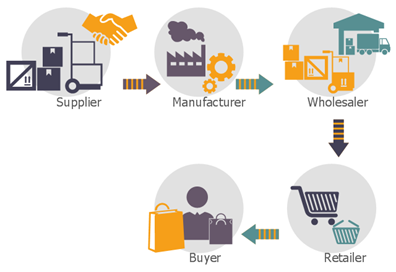4 Habits of Highly Effective Production Managers
Production managers are leaned on to continuously improve the production process. They face many challenges, one of which is to ‘do more with less.’ In other words, produce more goods using fewer resources and money.
This, as well as maintaining safety and compliance across the plant, improving quality and traceability, and implementing new technologies that could improve operations.
This expectation impacts any continuous improvement, KPIs, quality, maintenance and production processes, as well as supply chain and staffing decisions across the business.
In order to succeed with all that, innovation is required to meet daily production demands and improve operations into the future. Easier said than done with a busy workload and high-pressure environment.
To help, here are 4 habits that we’ve identified that are common among effective manufacturing managers and innovators in our space.

1. Connect to the supply chain
The supply chain involves many stakeholders, from raw material providers to wholesalers, retailers and eventually the end-user. For most production managers, the daily grind is a continuous loop with no end: meeting KPIs; solving production issues; managing staff; maintaining plant equipment. There’s rarely time for internal collaboration, let alone consulting with anyone further down the chain or even the end customer.
But connecting with customers is valuable. It will help you understand their pains, desires, new focus areas, future plans, and company updates. This information can be used to improve production.
For example, if new traceability regulations are front-of-mind for your customers down the chain, you’ll identify the need to re-focus your efforts in quality checks, training for staff, or traceability technologies and even suggest new business initiatives.
Build this habit:
Attend industry forums, organise informal client lunches, and talk to customer-facing employees in your organisation. Aim to do at least one of these per month. Understand customer pain points so you can prioritise improvement activities around these.
2. Harness the Power of Teamwork
The best managers are not interested in hogging the spotlight or earning praise. Continually increasing quality and always delivering on time are the two trophies most valued. And this means delegating whenever possible and helping employees to upskill and take on new responsibilities – then trusting in the team to work together and achieve goals.
Getting bogged down in urgent tasks can stop the important things like incremental improvements from being addressed. That’s where your staff can come in.
Spend some time developing your production staff to offload some of the day-to-day burdens and save the business time and money. Empowered staff are more proactive, make the right decisions independently, problem-solve, and champion change programs.
Build this habit:
Some actionable ways to involve your employees are to allow paths to promotion, provide relevant training, facilitate peer-to-peer training, involve employees in decision-making and strategy, and design job roles for autonomy and play.

3. Empower staff to be innovators
Employee empowerment programs have been widely adopted in the industrial sector as a way to improve organizational performance. Empowered employees improve performance largely by finding innovative ways of correcting errors in operations and redesigning work processes. Failure to encourage innovation can seriously undermine the effectiveness of your workforce.
Many of the best ideas come from employees, and higher levels of staff involvement will get the greatest buy-in for change. What’s more, it can also boost company performance.
Build this habit:
Make it easy for improvement suggestions to be fed back into the system through an improvement suggestion program, either through a social forum or a suggestions box. Recognise all suggestions publicly via official written communication or at monthly catch-ups and showcase ideas that were successfully implemented and executed.
Provide a framework in order to outline how improvement ideas should be tied to businesses goals. Ensure the business is actively assessing and implementing suggestions, to keep staff motivated to contribute
Importantly, make work a safe place to contribute by regularly encouraging suggestions, giving feedback and admitting your own mistakes.
4. Staying Up to Speed
The world of manufacturing and production is continually evolving, and the successful production manager must always move with the times. Having a plan to deal with changes as and when they arise is paramount. So, too, is a big appetite for new tech that can help operators – and indeed the entire supply chain – do their job more efficiently.
Build this habit:
There are plenty of ways to stay up to date with industry news, and the best way for you will depend on what you prefer. You could listen to industry-specific podcasts, like the Enterprise Excellence Podcast. You could subscribe to industry newsletters from your suppliers. Join an industry-specific group on LinkedIn or other social media platforms. Bring it up in general conversations with your superiors and colleagues so it becomes collaborative, and in case they hear about things before you do.
Be your best self
You’ll notice that a common thread through all of these is utilising the people around you. The very definition of being a manager means you will be working with a group of staff. This is a valuable asset that you should make the most of. Master these habits and you will be much more effective, making it much easier to achieve your targets and goals.